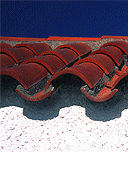
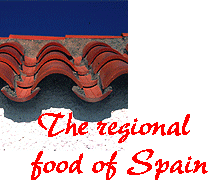
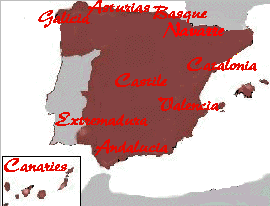 The
food and cooking of Spain, the regional
cuisines and Tapas
The
food and cooking of Spain, the regional
cuisines and Tapas
A brief guide and glossary of meaning of Spanish food terms in English
I hope Murcians, Cantabrians & the people of Rioja will not mind that I have blended them into other regions to minimise the number of pages!
As an Englishman visiting Spain 3 or 4 times a year, I have become aware of the many food traditions of the regions of the peninsula. From the fried fish of the south, the paella of the east and the roast meats of the centre to the fabadas of the north. Here I have tried to briefly describe the flavour of each region accompanied by a few recipes, links and recommended further reading. The recipes are my own interpretations of what I have eaten, I have tried to make them authentic, and have indicated where I know my recipes deviate from the norm.
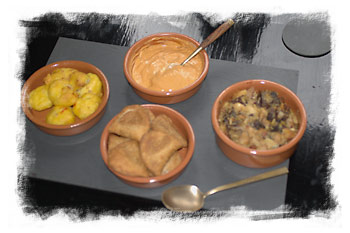 Tapas
Tapas
Originally
literally
a
cover
for
a
glass of wine, tapas have developed over the
years
in to a vast range of "snacks" to be accompanied
by a glass of wine,
beer
or sherry. To experience tapas at its best visit
the old quarter in San
Sebastian or tour the backstreets of Old
Madrid.
In both cities, although more noticeably in
Madrid, each tapas bar
specializes
in its own small range of tapas. One bar in
Madrid sells only prawns
with
sweet red wine, another only ham. Still another
is the home of salsa
bravas,
which arrives at the bar from a tap in the wall,
to be served on
potatoes
or tortilla. When you are served a drink in
Spain you may often get a
complimentary
snack of olives or almonds, in Castile, Galicia
or Grenada it may be
something
even more substantial if you are in a taberna
rather than a tapas bar
in
business to sell you snacks.
A "tapeo"
is the spanish equivalent of a pub crawl, the
art of the tapeador
consists of a peripatetic peregrination of sips
of wine, bites of food
and snippets of gossip. Will such sophistication
one day rub off on us?
By
the
way, knives may be considered bad form for
eating a tapa,
use a fork or nothing.
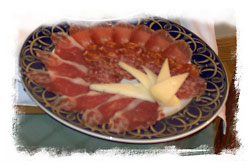 One
tapas
bar in San
Sebastian
specializes
in bread rolls filled with tortilla, peppers and
bacalao. All tapas in
San Sebastian has to be totally fresh and the
highly discerning locals
will only eat the freshest items. Here the
customer selects what takes
their fancy from the counter and pays at the end
after eating [see
cautionary
note].
One
tapas
bar in San
Sebastian
specializes
in bread rolls filled with tortilla, peppers and
bacalao. All tapas in
San Sebastian has to be totally fresh and the
highly discerning locals
will only eat the freshest items. Here the
customer selects what takes
their fancy from the counter and pays at the end
after eating [see
cautionary
note].
Alternatively
visit
its
source
in Andalucia,
Seville
would be a good bet .
Barcelona
has
"Xampanyeries",
bars
specializing
in
cava. However there is a
tendency in Catalonia to turn tapas into more of
a meal, with several
being
served on a plate and often eaten seated.
Tapas
books
Back
to Basque
food
Ensalad
Rusa (Russian salad)
There are
ennumerable atypical recipes
for this spanish stalwart on the web, its just
boiled cubed potato,peas
& carrot in mayonnaise.
Tapas
cautionary
footnote
-
A
rare
problem
in friendly San Sebastian.
Generally
this
rule
holds
good
in
San Sebastian. You pay for your "pintxos" by
counting
the cocktail sticks left on your plate. However,
one busy Saturday
night
in "Bar Aracar" we started browsing as usual. But
when we came to pay
the
staff became awkward and demanded a stupid amount
of money. It seems
they
had introduced a new policy for tourists, against
the honour system in
evidence elsewhere, and were asking customers to
select tapas, then
show
them to staff before receiving drinks. We had not
heard them say this
to
us, or possibly they had said it in German.
Anyway. given that they
could
easily have kept an eye on how much we ate plus
the fact we were
volunteering
to pay for 12 tapas, (a high number) I felt their
attitude was
inappropriate
and highly untypical of San Sebastian. Anyway,
this is something to
watch
out for which I hope will not spread with the
numbers of tourists and
backpackers
visiting.)
Glossary
/ Dictionary - Spanish to English translation.
Catalan
Note:
Several
words translate
as "prawn" (USA shrimp) due to the lack of specific
words in English
A
la plancha - griddled and dressed with oil,
garlic and parsley
A
la Sal - fish baked in a block of salt
Abocado
-
medium
sweet
Aceitunas
-
olives
Adobo
-
marinaded
in
vinegar
and
spice (often cumin)
Ahumado
-
smoked
Ajo
-
garlic
ajonjolí
-
sesame
Albacora
-
albacore,
a
small
tuna
Albariza
-
chalky
soil
that
sherry
grape grows on
Albondigas
-
meatballs
Alcachofa
-
artichoke
Alfajoa
-
Senegal
seabream
Allioli
-
a "mayonnaise" emulsion of garlic and oil,
classically without egg
Alubias
-
haricot
beans
Almuerzo
-
second
breakfast
Amontillado
-
aged
and
oxidised
dry
sheery
Anchoa
-
anchovy,
sometimes
sold
fresh.
Angelote
-
monkfish,
see
also
rape.
Angulas
-
Baby
eels,
"gulas"
are
manufactured versions made from Alaskan
pollack.
Ajete,
Brotas
or
Ajo
tierno
-
young green garlic shoots
Al
Horno
- baked in the oven
Arroz
a
la
Marinera
-
seafood
and rice simply cooked together
Arroz
-
rice
or
rice
dishes
on menu
Arroz
seco
-
dry
rice
dish
Arroz
meloso
-
creamy
rice
dish
(as in rissotto)
Arroz
caldoso
-
brothy
rice
dish
Arroz
Negro - squid ink rice
Asador
-
charcoal
grill.
Asadores
-
restaurant or chef specializing in roast
meat
Azafran
-
Saffron
Babilla
-
the
narrowest,
leanest
part
of a ham
Bacalao
-
Salt
cod
Baila
-
spotted
seabass
Banderilla
-
actually
a
bullfighting
"dart",
tapa on a cocktail stick or little
sword.
Barbacoa
-
BBQ
-
Barbecue
Barraquito
-
espresso
coffee,
condensed
milk,
alcohol, topped with
Cinnamon
(Canaries).
Becada
-
Woodcock
Berejenas
-
aubergines
Besugo
-
Red
Bream
Bienmesabe
-
fish
marinated
and
deep
fried in cubes, away from Andalucia may be
meringue
or "almond jam" , literally something like
"tastes good to me"
Bocadillo
-
filled
roll.
Bodega
-
sherry
warehouse
Bodegon
-
tapas
bar
serving
mainly
drinks
Bogavente
-
lobster
Boletos
comestible - cep/porcini/penny
bun
Bonito
-
Sarda sarda, a small tuna
Boquerones
-
anchovies
Boraje
- borage (the stems are used as
a vegetable in parts of northern Spain)
Brasa
- cooking over embers
Botellon
-
unofficial
street/park
party
in
which young people bring bottles from
supermarkets
Buey
-
crab
Buñuelos
-
bun
shaped
savoury
fritters
Burgado
-
winkle
Caballa
-
mackerel
Cabracho
-
Scorpionfish
Cacerola
-
casserole
pot
Cachuela Extremeña
- coarse cut spicy pate.
Café
-
coffee.
Solo
-
strong
black, cordato - with a little milk, leche
manchada
- milk with a dash of coffee, con hielo - iced,
con leche - white.
Calabacin
-
Courgette
Calabasa
-
Squash
Calçot
-
Catalan
blanched
onion
shoots,
looking like a large leek, used in the
casserole "Calçotada"
Caldo
-
broth
(Caldo
Gallego
is
of pork beans and cabbage)
Caldereta
de
Langosta
-
lobster
stew
Callos
a
la
gallega
-
galican
thick stew using tripe etc.
Camaron
-
prawn.
("El
Cameron
de
la Isla" is the name of the legendary flamenco
singer of small stature from Cadiz).
caña
-
glass
of
draught
beer
Carabinaros
-
large
dark
red
prawns
Cantaro
-
earthenware
water
jug
Cangrejo
-
"river
crab"
or
crayfish,
Cangrejo de mar - shore crab
Carajillo
-
espresso
coffee
with
flamed
alcohol.
Carnes
-
meats
Castañas
-
chestnuts
Cava
-
Spanish
sparkling
wine
Caza
-
game
Cazon
(kath-on)
-
huss,
dogfish,
smoothhound
Cazon
adobado,
Huss
(smoothhound)
marinated
and
deep fried in cubes
Cazuela
(cath-whaler) - earthenware cooking pot
Cebolla
-
onion
Cecina
de
Leon
-
cured
beef
Cerdo
Iberico - black Iberian pig
Ceña
-
evening
meal
Centolla
(sen-toy-a) - spider crab
Cerveceria
-
bar
specialising
in
beer
Champiñón
-
the
cultivated
mushrooms
(agaricus)
Chato
-
glass
of
red
wine
from the barrel
Cherne
-
wreckfish
or
stone
bass
Chigre
-
Asturian
cider
bar
Chiquito
-
small
glass
of
wine
Chilindron,
al - cooked with red (bell) peppers
Chiringuito
-
beach
shack
bar/restaurante,
often
with surprisingly good food.
Chistorra
-
Navarre
sausage
Choco
-
cuttlefish
Chorizo
-
hard
generally
spicy
sausages
Choricero
-
(bell)
pepper
often
dried.
Churros -
breakfast fritters
Churreria
-
churros
kiosk
Cigala
-
dublin
bay
prawn,scampi
Cigarra
-
flat
lobster
Clara
-
shandy
Coca
-
open
tart
like
a
thin
pizza
Cocarrios
-
pasties
Cochinillo
-
suckling
pig,
speciality
of
Castile
Cocido
-
classic
country
casserole
Cocina
casera
-
home
cooking
Cordoniz
-
quail
Cortador
-
person
who
slices
ham
Conejo
-
("con-ek-o")
rabbit
Coñeta
-
green
shore
crab
corvina
-
meagre
Crema
Catalana
-
a
type
of
creme caramel with a hard caramalised sugar top,
browned
with a Salamander (a heated iron).
Croqueta
-
Croquette,
typically
a
breadcrumbed
cylinder made from creamed
potatoes
flavoured with ham, salt cod or chicken.
Degustacion
-
tasting
Dehesa
- open cork oak forest used for extensive pig
rearing.
Desayuno
-
breakfast
Doble
pasta
-
wine
produced
with
double the amount of grapeskins
Dorada
-
gilt
head
bream
Duelos
y Quebrantos - scrambled eggs with pork
Dulce
-
sweet
Empanada
- savoury pastry pie from Galicia
Ensalada
-
salad
Ensalada
rusa - "russian" salad, mayonaisse, potato,
carrot, peas
Ensaimada
-
Mallorcan
cake
Entradas
-
starters
Erizo
de
mar
-
sea
urchin
Escabeche
-
a
vinegar
and
garlic
marinade
Espejo
Líquido
Semidulce
-
dessert
wine
of Almagro
Estafadas,
estofada
(Cat)
-
stews
Exxencia
de
Bornos
-
rare
"noble
rot" dessert wine from Castile
Fabada
-
Asturian
stew
of
white
beans and pork
Farinata
-
sausage
from
Ciudad
Rodrigo
Faisan
-
pheasant
Fideua,
Fideus, Fideos - seafood pasta
Fino
-
dry
sherry
Flamenquinas
- deep fried pork rolls
with egg, peppers & ham
Flor
-
adventageous
yeast
growing
on
surface
of sherry in barrel
Frit
or
frito
-
Mallorcan
liver
and
vegetable fry. Frito - fried in oil.
Fricandó
-
Catalan veal and mushroom stew
Freiduria
- fried fish restaurant
Gachas
- a thickened soup using toasted wheat flour or
pea flour with pork
from
La Mancha with regional variations elsewhere
Galera
-
mantis shrimp
Gallo -
a
relative
of the John Dory, halibut like taste.
Gamba
-
prawn
Gamonedo
-
lightly
smoked
blue
cheese
from Cangas de Onis
Garrofón
-
lima
beans
Gazpacho
- cold soup - often now based on tomato
Grelos
- turnip greens - as in the Galician dish "lacon
con grelos" cured pork
with greens
Guachinche
-
informal
seasonal
bars
selling
local wine and food on Tenerife.
Guibelurdina
-
wild
mushroom
Russula
cynaxanta
Guisantes
-
peas
Guiso
-
stew.
Guisos
-
the
"stews" section of a (probably Andalucian) menu,
as
opposed to "fritos", fried.
Gulas
-
"synthetic"
angulas
(baby
eels)
from Alaskan pollack, produced
because
of falling catches.
Herrera
-
striped
seabream
Hierbas
-
Mallorcan
herb
liquer
Hojaldre
-
puff
pastry
Hornazo
-
bread
crust
pie
filled
with various types of pork (Extremadura, Castile)
Hongo
-
mushrooms,
(also
used
to
mean fungi)
Horno
-
oven
Huevos
-
eggs
or
menu
category
for egg dishes
Jamon
Serrano
(ham-on)
-
unsmoked
cured
ham from the mountains (Jabugo is
considered
the best)
Kokotxas
-
Basque
speciality
of
Hake
cheeks
Lacon
-
cured
pork,
con grelos
Lagrima
-
first
pressing
Langosta
-
spiny
lobster
Langostino
-
large
prawn
Lomo
-
..de
cerdo
loin,
..de
vaca
(latin america) fillet steak
Longaniza
-
sausage
with
cinnamon
and
cloves
Lubina
-
Bass
Manzanilla
-
Camomile
tea
and
the
very dry sherry that has taken its name from it.
Marinera
-
fisherman
style
Matalahúva
-
anise
Matanza
-
winter
pig
killing
and
morcilla and chorizo making festival.
Maza
-
the
widest
fattest
part
of
a ham or a meat tenderiser.
Membrillo
-
quince,
a
quince
"jam"
is popular in Spain (with cheese).
Merendero
-
open
air
eating
place.
Merienda
-
afternoon
snack,
merienda
cena
- high tea.
Merluza
-
hake
Mero
-
grouper
Migas
-
sauteed
breadcrumbs
with
bacon,
served at breakfast
Mojama
-
wind
dried
tuna
Mojarra
de
Piedra
-
two
banded
seabream
Mojo
(mo-ho) - Canarian sauces for potatoes and fish
(red and green)
Mollejas
-
sweetbreads
Morcilla
(more-see-a) - Blood sausage or black pudding,
"Burgos" version with
rice,
also other versions with onion, herbs etc .
Morros
-
pork
fat
next
to
the skin in tomato sauce (Extremadura).
Montadito
-
minature
bocadillos,
delicacies
on
bread.
Moros
y
cristianos
(moors
and
christians)
- rice and black beans, often
served
with meat.
Necora
-
swimming
crab
Ñora
-
dried
small
red
peppers
"dulce" sweet or "picante" hot.
Oloroso
-
an
aged
aromatic
sherry
type
Olla
-
deep
cooking
pot
Oricio
-
sea
urchin,
also
Erizo
de mar.
Pachero
-
stew
pot
Patudo
-
tuna
relative
Pa
amb
oli - bread with olive oil and (optionally)
rubbed with tomato and
garlic,
from
Mallorca,
now
fashionable
elsewhere
Pasada
-
aged
manzanilla
Papas
Arrugadas
-
Canarian
potatoes
cooked
in seawater
Parilla
(a
la)
-
grilled
Paella (pie-ay-a)
-
strictly the curved metal pan used to cook the
dish of the same name
- but
the dish is now often called a paellera.
Pargo
-
Sea
Bream
Pato
-
duck
Perdiz
-
Partridge
Peto
-
like
swordfish
Parrillada
(par-ee-arder)
-
grilled
mixed
dish
(usually fish)
Pasada
-
aged
manzanilla
Patatas
Pobres
-
"poor
man's
potatoes"
fried with garlic and spices.
Pescados
y
Mariscos
-
fish
to
eat (a live fish is "pez") and seafood
Percebes
-
goose
barnacles,
a
superb
delicacy of the northern coast, won from
the
sea at some risk to the fishermen
Peto
-
related
to
tuna
Pez
de
San
Pedro
-
John
Dory
("pez" is a fish in the sea, "pescado" is a fish
in the fishmongers)
Pez Espada - Swordfish
Picata,
picada (Cat) - pounded ingredients used to
thicken sauces - liver,
bread,
garlic, piniones (pine kernels) etc.
Picadillo
-
A
chopped
sauce.
For
example: diced tomatoes, onion and peppers in
olive
oil.
Pichón
-
pigeon
Pijota
-
a
type
of
hake,
(juvenile, I believe)
Pil-pil
-
sauteed
in
oil
and
garlic and chilli with constant shaking to form
an
emulsion with the fish gelatin.
Pimiento
-
Sweet
red
pepper
Pimienton
-
Paprika
Pinchos
-
see
tapa
Pintada
-
guinea
fowl
Piperade
-
Sweet
pepper
omelet.
Pisto
Manchego
-
ratatouille
type
stew
Plancha
(a
la)
grilled
on
hot-plate
Polvorones
-
Andalucian
cake
like
biscuits,
made from finely ground almond and
icing
sugar.
Postres
-
desserts
Potaje
or
sopa
-
soup
Pulpo
-
octopus
-
often
a
tapa in Galicia with hot paprika - "pulpo
gallego"
or known as "pulpo a feira" locally.
Punta
(of
ham)
-
tip
of
the joint opposite from the hoof.
Queixo
-
cheese
(Gallego)
Queso
-
cheese
Quesado,
Quesadilla
-
cheesecake
(sweet,
not
savoury).
Quisquilla
-
small
prawn
or
shrimp
Racione
-
larger
than
a
tapa,
eaten with knife and fork
Raf
-
an
excellent
uneven
shaped
fleshy
tomato
Rape
-
angler
fish,
but
often
called
monkfish (see angelote). There seems to
be
some confusion in the english naming between
angel fish and angler fish.
Rellenas
-
stuffed.
Remolacha
-
sugarbeet
Remolacha
roja
-
beetroot
Reserva
-
three
years
in
wood
Revuelto
-
scrambled
eggs
Robalo
-
seabass,
lubina
is
the
usual name, this is the Portugese name
Rodaballo
-
turbot
Romesco
(Xato,
Salbitxada)
-
Catalan
pounded
sauce typically of bread, garlic,
tomato, almonds, ñora (Cat. nyora - dried
slightly hot
peppers,
not chillis as many recipes say) and paprika.
Mixed with wine vinegar
and
olive oil.
Roncador
-
Bastard
Grunt
or
Pomadasys
Incisis
Sacromonte,
tortilla
de
-
brain
omelette
Salsa
-
sauce
Salsa
Mahonese
-
mayonnaise,
reputedly
invented
in Mahon, Menorca.
Salmonete
-
red
mullet
Salmorejo
-
Cordoban
gazpacho
Sama
-
a
firm
white
dentex
Samfaina
-
Catalan
ratatouille
Sargo
-
white
seabream,
diplodus
sargus
Seco
-
dry
Sesos
-
brains
Setas
-
wild
mushrooms
Sidra
-
Asturian
still
cider
Salchicha
-
fresh
sausage
Salchichon
-
cured
sausage
Salmonete
-
red
mullet
Salmorejo
-
Cordoban
gazpacho
Saltén
-
thin
frying
pan
Serrano
- cured ham
Sobresada
-
Mallorcan
pork
sausage
Socarrao
- the crisp finish of a paella
Sofrito,
(Catalan Sofrigit) - onion, garlic and tomato
cooked down in olive oil
to form base for a dish
Solera
-
series
of
butts
in
which the older are topped up from the younger
to
obtain desired consistency and character. Sherry
is therefore not of a
vintage, and is in theory partly as old as the
bodega.
Solomillo
(sol-o-me-o)
-
centre
fillet
of
beef, lamb or pork
Sopas
Mallorquinas
-
brown
bread
soaked
in soup
Suquet
-
Catalan
fish
stew
Tabella
-
butter
beans
Tala
-
Maize
cake
Tarta
de
Santiago
-
almond
tart
Tasca
-
bar
or
tavern,
serving
food
Tapa,
Tapas, Tapeo, Tapeador
Torta
del
Casar
cheese
from Extremadura
Torta
de
Aceite
-
a
anise
and sesame flavoured olive oil snack or dessert
biscuit/crisp-bread
from Sevilla.
Tortilla
- (Spanish Omelette) (tor-tee-a) - potato,
onion and egg "cake"
Tortilla
de
Sacromonte
-
sheeps
brain
omelette
Tortillitas
- flour based fritters a little nearer to the
South American tortilla.
Trato
-
"friendly
service"
is
the
nearest in english, that little extra
interaction
between customer and waiter. The opposite of
formulaic "have a nice
day"
service.
Tumbet
-
Mallorcan
Aubergine,
courgette
and
potato fry.
Turron
-
hard
nougat
like
sweet.
Txakoli
-
Basque
petillant
wine
Txanqurro
rellenos - Basque stuffed crab
Txistorra
-
Basque
spicy
sausage
Urta
-
red
banded
seabream,
a
large
bream
Vapor
-
steamed
Verduras
-
vegetables
Vichy
Catalan
-
strong
flavoured
water
from Caldes de Malavella, "Vivaris" is
a slightly milder water of a similar style.
Vieiras
-
scallops
Vieja
-
parrot
fish
Vino
tierno
-
Malaga
wine
from
sun
dried grapes
Vi
ranci
(Cat)- rich sauce from an old wine
Xampanyeries
-
Catalan
cava
tapas
bars
Yemas
-
dessert
of
raw
egg
yolk and sugar
Zamburiña
-
(vieiras)
scallops
Zarzamora
-
blackberry
Zarzeula,
sarsuela
(Cat)
-
literally
a
musical comedy of fish, a fish stew
Zizak
-
wild
tricholoma
mushroom
(Basque)
Zorza
-
a
pork,
paprika
and
garlic mix (sometimes used in empanadas)
Zurito
-
a
small
beer
Note
for
USA
readers
US
shrimp
= European prawn (large)
US
prawn
= European shrimp (small)
so
a Spanish
quisqullia = European shrimp
a
Spanish
langostino = Dublin bay prawn or scampi
and
a
Spanish
gambas
=
European
prawn
Walking in Spain | Spanish photos | Spanish pronunciation & general guidebooks | Spanish food - Andalucia | Food - Asturias | Food - Basque Country | Food - Canary Islands | Food Castile | Food - Catalonia & Balearics | Food - Extremadura | Food - Galicia | Food - Navarre & Aragon | Food - Valencia | Tapas | Glossary |Books
